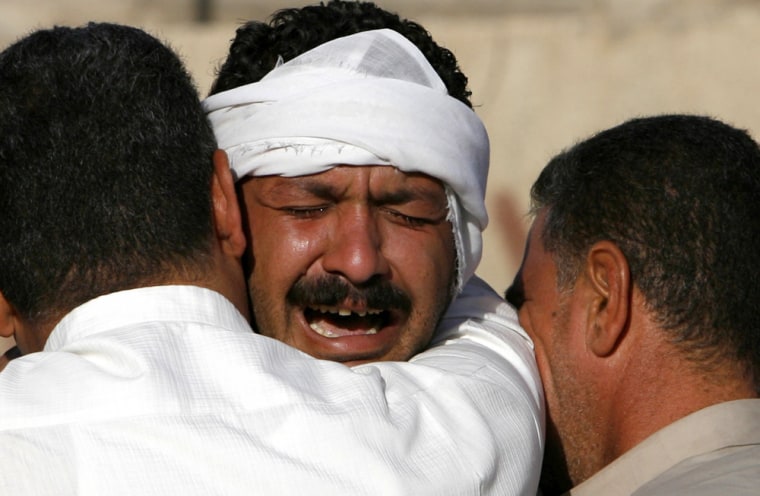Iraq’s prime minister Nouri Maliki pleaded for Iraqis to “unite as brothers” on Monday but a fresh spasm of violence gripped Baghdad, where 60 people were killed at the weekend in a dramatic escalation of sectarian bloodletting.
Dozens of gunmen exchanged heavy fire after dark in mainly Sunni western Baghdad on Monday. One Shiite militiaman, reached by telephone, said he and other Mehdi Army fighters loyal to cleric Moqtada al-Sadr were raiding the Sunni Ghazaliya district.
“We’re going to clean the terrorists out of this area,” the militant told Reuters. Ghazaliya, a stronghold of militant Sunni Arabs, is close to the Sunni Jihad district where Shiite gunmen killed over 40 people on Sunday in broad daylight.
Police sources said dozens of gunmen moved in to Ghazaliya and attacked two Sunni mosques. They withdrew an earlier report of an attack on a Shiite mosque. Residents heard heavy clashes.
‘Our destiny’
Earlier, two bombs in a Shiite neighborhood killed 12 and wounded dozens, while gunmen ambushed a commuter bus in a Sunni district and shot dead seven people. Militiamen, believed to be Shiite, also fought gunbattles in a southern Sunni district.
“Our destiny is to work together in brotherhood to defeat terrorism and insurgency,” Maliki, a Shiite, told the Kurdish regional parliament in northern Iraq. “We have no choice but to defeat those who want to return us to the black days.”
Fearing Iraq is moving ever closer to all-out civil war, President Jalal Talabani, a Kurd, had appealed for calm, warning that the country was on “the edge of a slippery slope”.
A new surge in violence between majority Shiites, oppressed under Saddam Hussein but now politically empowered, and his once dominant fellow Sunni Arabs has laid bare a deepening schism, despite Maliki’s efforts to promote national reconciliation.
Two bombs blasted a Baghdad area that is a stronghold of Shiite militia fighters early on Monday, a day after suspected Shiite gunmen stormed through Jihad and killed over 40.
Bloodshed continues
Twelve people were killed and 62 wounded, police said, in the car bomb blasts near a telephone exchange in the eastern Talbiya district. It is a bastion of the Mehdi Army.
Police in the notoriously violent Sunni district of Amriya found four bodies on a commuter bus. Three others, including a woman, lay in the street nearby, apparently dragged from the bus and shot. Their religious affiliation was not immediately clear.
In the mostly Shiite western district of Ammil, unknown gunmen opened fire on an unmarked car carrying four policemen, killing three, police said.
There were conflicting reports about clashes involving suspected Shiite militia fighters in the Sunni Dora district in southern Baghdad, where the Interior Ministry imposed a curfew until 8 a.m. on Tuesday.
One police source said six militiamen lay dead on Dora bridge after a shootout with residents. Another said the gunbattles involved militias on one side and the Iraqi police and army on the other and that five soldiers were wounded.
Police behind violence?
Sadr’s group rejected accusations by Sunni leaders and police that it was behind killings in the mainly Sunni Jihad district of west Baghdad on Sunday, when bands of gunmen set up roadblocks and hauled people with Sunni-sounding names from cars to shoot them. They also killed others in streets and homes.
Those killings, the worst of their kind yet seen in the city, came after a car bomb attack on a Shiite mosque in Jihad on Saturday evening and were followed by a double car bombing at another Shiite mosque late on Sunday that killed 19.
Maliki has vowed to disband militias, some tied to parties in his government, that are carving Baghdad into sectarian no-go areas. But he faces an uphill struggle as most, including the Mehdi Army, have powerful allies inside the ruling coalition.
Thousands killed in sectarian violence
Simmering tensions between Shiites and Sunnis, mistrustful of the new Shiite-dominated coalition government and the backbone of the insurgency, exploded into open conflict after a revered Shiite mosque was bombed in February.
Thousands have since been killed in tit-for-tat killings, mainly in Baghdad. Maliki’s U.S.-backed government of Shiites, Sunnis and Kurds has struggled to contain the violence that has also forced tens of thousands of people from their homes.
Maliki has promoted a national reconciliation plan to end the communal bloodshed and end the insurgency, but critics, including some Sunni leaders, say it is too vague.
Nevertheless, British ambassador William Patey said “now more than ever” Iraqis needed to back the plan, to defeat “those criminals” trying to plunge the country into civil war.
